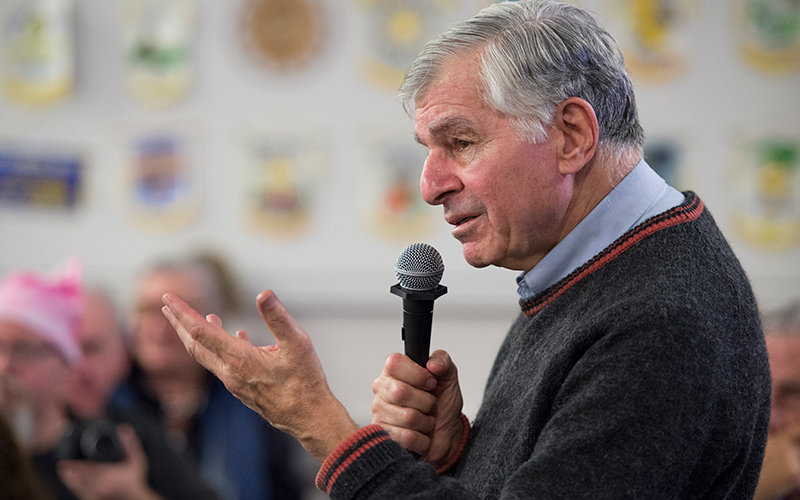
“It’s a very interesting situation we find ourselves in,” said Michael Dukakis, former Massachusetts governor who ran for president in 1988, speaking before more than 100 campus and community members on the day after the inauguration of U.S. President Donald Trump (Jan. 21).
Dukakis kept the interest high as he gave a wide-ranging talk covering a bit of his own family, as well as U.S. political history, the Electoral College, foreign policy, education and health care at the Jan. 21 Patrons of the Pollak Library lecture program.
“I have a confession to make, ever since Trump won, except he didn’t win except in this crazy system … the Electoral College has to go … and it should have gone 200 years ago.”
About the country’s new president, “the short answer, at least for me, and I suspect for everyone in this room, is I haven’t the slightest idea what’s going to happen,” he said.
Dukakis quickly moved the discussion into American foreign policy and noted his dissatisfaction with how it’s been handled, often with military intervention, resulting often in catastrophic results.
“Now we find ourselves in what I would call a new Cold War, involving cyber war,” he explained. “And this, folks, if it doesn’t stop, we’re going to spend billions and billions dollars, and so will the Russians, in a new arms race.”
Right now five-sixths of the world’s surface is conflict free, including the Western Hemisphere, Dukakis pointed out. Yet, “yesterday, Trump said our military is weak and it was neglected. Is he serious? We spend more on our military than the next seven countries combined, including Russia and China.
“Interesting enough, some of the most sensible people that he (Trump) has appointed are the generals.”
Dukakis pointed to one, Gen. John F. Kelly, who said that a wall across the Mexican border would not solve the problem with immigration. Dukakis agreed, noting that while he doesn’t support illegal immigration, “as long as people see opportunity, some are going to come north.”
The former politician, now a professor of political science at Northeastern University, gave kudos to the success of Obamacare for the number of individuals who signed up. Dukakis reviewed the historic efforts, from President Calvin Coolidge to President Richard Nixon, that had previously been tried to create affordable health care, then noted that the new administration seems to be heading to privatizing Medicare — “a most ridiculous thing. Why would you want old folks like Kitty (his wife) and me to shop around for health care?”
Dukakis hoped that the new administration would look to how others around the world are dealing with health care and other issues, such as climate change and public transportation. “Isn’t it time we join the rest of the industrialized world?
“Let’s take some satisfaction with what we have accomplished” — noting the drop in urban violence, improvements in K-12 education and growth in the number of young people going to college — “But we still have things to do.
“I’m an optimist,” Dukakis said. “You can’t be a pessimist and be serious in politics.”